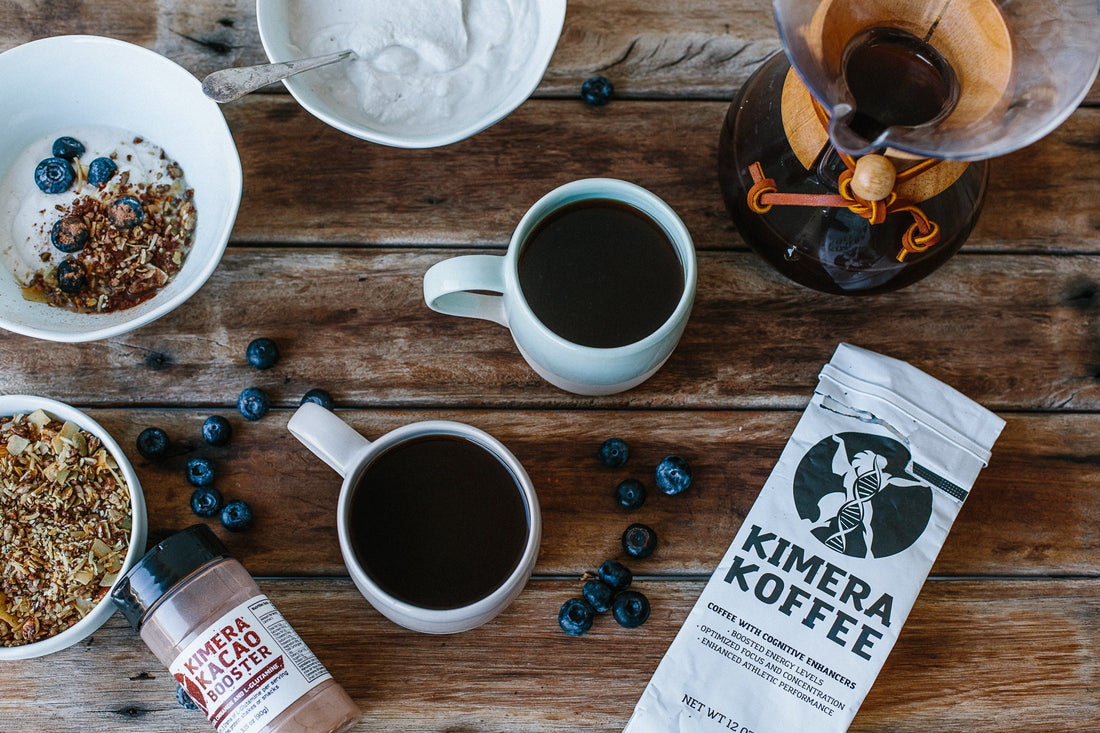
6 Healthy foods you can pair with Coffee to help lift your mood
6 Healthy foods you can pair with Kimera Koffee to help lift your mood
- Dark chocolate
Chocolate is rich in many mood-boosting compounds.
Its sugar may improve mood since it’s a quick source of fuel for your brain.
Furthermore, it may release a cascade of feel-good compounds, such as caffeine, theobromine, and N-acylethanolamine which a substance chemically similar to cannabinoids that has been linked to improved mood.
It’s high in health-promoting flavonoids, which have been shown to increase blood flow to your brain, reduce inflammation, and boost brain health, all of which may support mood regulation.
Finally, chocolate has a high hedonic rating, meaning that its pleasurable taste, texture, and smell may also promote good mood.
Because milk chocolate contains added ingredients like sugar and fat, it’s best to opt for dark chocolate — which is higher in flavonoids and lower in added sugar. You should still stick to 1–2 small squares (of 70% or more cocoa solids) at a time since it’s a high calorie food. You can also try our Samurai creamer which has raw cacao.
- Fatty fish
Omega-3 fatty acids are a group of essential fats that you must obtain through your diet because your body can’t produce them on its own.
Fatty fish like salmon and albacore tuna are rich in two types of omega-3s — docosahexaenoic acid (DHA) and eicosapentaenoic acid (EPA) — that are linked to lower levels of depression.
Omega-3s contribute to the fluidity of your brain’s cell membrane and appear to play key roles in brain development and cell signaling.
While research is mixed, one review of clinical trials showed that in some studies, consuming omega-3’s in the form of fish oil lower depression scores (8Trusted Source).
Although there’s no standard dose, most experts agree that most adults should get at least 250–500 mg of combined EPA and DHA per day.
Given that a 3.5-ounce (100-gram) serving of salmon provides 2,260 mg of EPA and DHA, eating this fish a few times per week is a great way to get these fats into your diet.
- Fermented foods
Fermented foods, which include kimchi, yogurt, kefir, kombucha, and sauerkraut, may improve gut health and mood.
The fermentation process allows live bacteria to thrive in foods that are then able to convert sugars into alcohol and acids.
During this process, probiotics are created. These live microorganisms support the growth of healthy bacteria in your gut and may increase serotonin levels.
It’s important to note that not all fermented foods are significant sources of probiotics, such as in the case of beer, some breads, and wine, due to cooking and filtering.
Serotonin is a neurotransmitter that affects many facets of human behavior, such as mood, stress response, appetite, and sexual drive. Up to 90% of your body’s serotonin is produced by your gut microbiome, or the collection of healthy bacteria in your gut.
In addition, the gut microbiome plays a role in brain health. Research is beginning to show a connection between healthy gut bacteria and lower rates of depression.
- Bananas
Bananas may help turn a frown upside down.
They’re high in vitamin B6, which helps synthesize feel-good neurotransmitters like dopamine and serotonin.
Furthermore, one large banana (136 grams) provides 16 grams of sugar and 3.5 grams of fiber.
When paired with fiber, sugar is released slowly into your bloodstream, allowing for stable blood sugar levels and better mood control. Blood sugar levels that are too low may lead to irritability and mood swings.
Finally, this ubiquitous tropical fruit, especially when still showing green on the peel, is an excellent source of prebiotics, a type of fiber that helps feed healthy bacteria in your gut. A robust gut microbiome is associated with lower rates of mood disorders.
- Oats
Oats provide fiber that can stabilize your blood sugar levels and boost your mood. They’re also high in iron, which may improve mood symptoms in those with iron deficiency anemia.
Conclusion
If your sad or feeling down, you may crave calorie-rich, high sugar foods like ice cream or cookies to try to lift your spirits.
While this might give you a sugar rush, it’s unlikely to help you in the long term — and may have negative consequences as well.
Instead, you should aim for wholesome foods that have been shown to not only boost your mood but also your overall health. Try out some of the foods above to kick-start your positivity routine.



